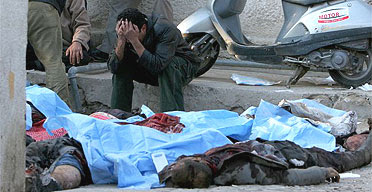At least 71 Shia killed as bombers lure job seekers into minibus trap
 As Bush continues to hum and haw over the Iraq Study Group Report, the latest proof of a country on the brink of collapse came yesterday with yet another dual car bomb, this one killing 71 Shia's and wounding another 200 as they waited in line for work.
As Bush continues to hum and haw over the Iraq Study Group Report, the latest proof of a country on the brink of collapse came yesterday with yet another dual car bomb, this one killing 71 Shia's and wounding another 200 as they waited in line for work.
Government forces were said last night to be on alert for Shia reprisals.The coordinated blasts happened at 7am on Tayaran square, a well-known gathering point for casual labourers looking for work. Witnesses said a suicide bomber driving a minibus approached workers and told them to get on board. As they did so he set off his explosives. At almost the same time a second bomb detonated in a car parked 30 metres away.
"The square was packed and the bombs blew us all over," said Ali Hussein, a labourer from Sadr City. "It is difficult to believe anyone is alive."
Surrounding buildings were severely damaged and dozens of shops and cars destroyed. The blasts left two charred craters filled with debris and body parts. Ambulances came from across the city, but for many it was too late. Hospitals were overwhelmed and morgues overflowed.
All of this comes as a recent poll reveals that most Americans think the US is losing the war in Iraq and favour James Baker's Iraq Study Group proposals.
Nearly eight in 10 Americans favor changing the U.S. mission in Iraq from direct combat to training Iraqi troops, the Washington Post-ABC News survey found. Sizeable majorities agree with the goal of pulling out nearly all U.S. combat forces by early 2008, engaging in direct talks with Iran and Syria and reducing U.S. financial support if Iraq fails to make enough progress.Neither the Bush administration nor the Democrats seem to be embracing this report, with the Dems angry that it doesn't call for immediate withdrawal and the Bush administration and their supporters viewing it as some sort of surrender document.
However, there can be surely no doubt that the Iraq war is lost. The trick now is how can the US extricate itself without the country descending into an even more severe form of civil war. That, to me, was the balance that Baker and his team sought to address.
In Washington, the powers that be continue to drag their heels and have delayed any firm decisions regarding Iraq until January. Meanwhile, the carnage continues.
However, the American public appear to have lost all faith in this war and the ability of Bush and Co. to bring it to a conclusion.
The public's discontent with the war has grown even since last month's congressional elections, when voters tossed out Republican majorities in favor of Democrats critical of Bush's leadership in Iraq. Bush's approval rating now stands at 36 percent, down four points from before the elections and the second-worst of his presidency. The poll found the lowest-ever approval for his handling of Iraq, 28 percent.
Overall, 52 percent now say, the United States is losing the war, up from 34 percent last year. Three in 10 say the United States is making significant progress in restoring civil order; nearly half thought so in June. And 41 percent say Iraq is now in a civil war, up from 34 percent in August. Forty-five percent describe the situation as close to a civil war.
Although the public remains leery of immediate withdrawal, it has lost faith that the Bush administration has a clear solution for Iraq. Twenty-five percent think it does, down 13 points since September. Even Republicans are no longer convinced, with 49 percent saying the president has a clear plan, down 22 points since September. The solace for Bush is that just as few Americans say the Democrats have a clear plan.
The public is more open to the Iraq Study Group plan, with 46 percent for it and 22 percent against it. When asked about some of its specific recommendations, respondents are dramatically more supportive. Seventy-nine percent favor shifting U.S. troops from combat to support; 69 percent support withdrawing most combat forces by early 2008; 74 percent support reducing aid if Iraq fails to make progress toward national unity and civil order; and about six in 10 support talking with Syria and Iran to try to resolve the conflict.
tag: Baker report, Bush, Iraq war, "Stay the course", casualties, rising























No comments:
Post a Comment